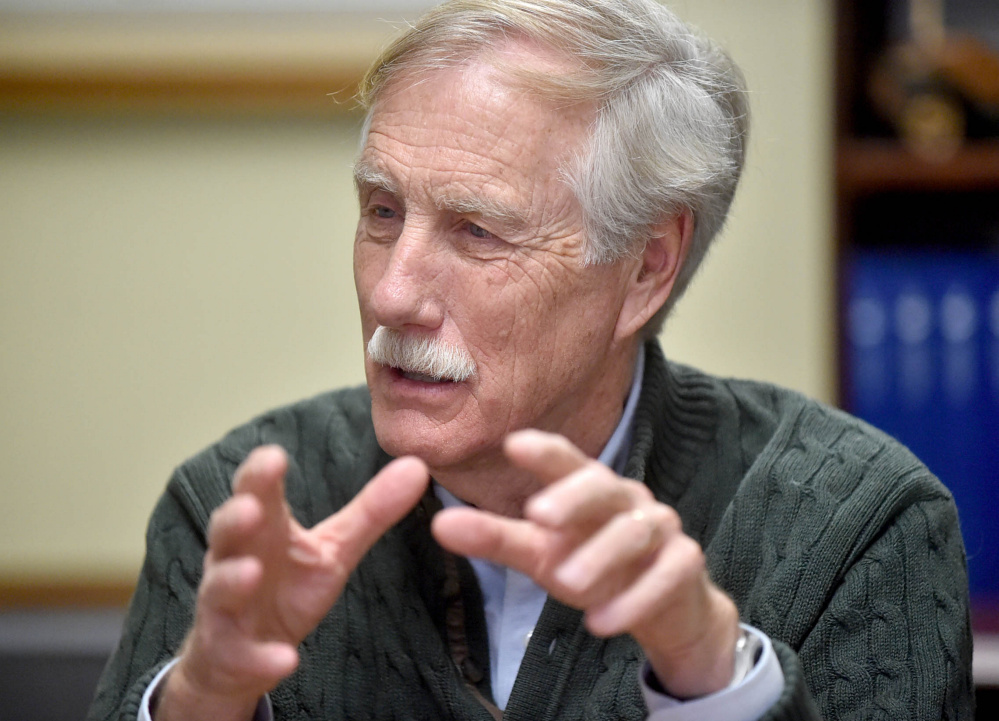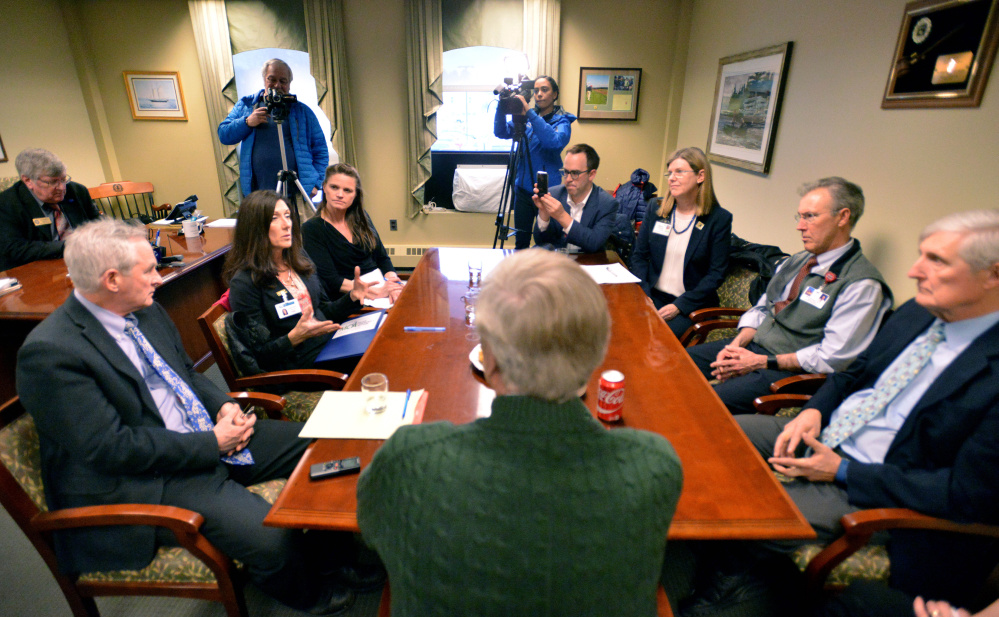SKOWHEGAN — U.S. Sen. Angus King, I-Maine, took aim Friday at House Republican efforts to overhaul the nation’s health care system just hours before a scheduled floor vote on a controversial bill was withdrawn, as he met at Redington-Fairview General Hospital with health care professionals to probe the growing opioid crisis and lament how GOP proposals would worsen the problem.
“My sense is this is an all-hands-on-deck problem,” King told the group. “The big part of this is educating the public of the nature of the problem, the magnitude of the problem, and what works.”
King, calling the drug addiction crisis a “disaster that’s coming at us, in addition to what we are already seeing,” at times blasted the House GOP bill for its proposed cuts to the Affordable Care Act, saying such reductions “would be devastating” and would make it even harder to treat those struggling with drug addiction.
King acknowledged that the Affordable Care Act needs some changes, but the repeal and replacement also is an economic issue.
He said any repeal of the Affordable Care Act would have a profound impact on rural hospitals and patients alike, especially people struggling with opioid addiction. He said in eight of Maine’s 16 counties, including Somerset County, of which Skowhegan is the county seat, the local hospital is the largest employer.
“It would be a disaster, frankly,” he said. “What we’re finding is that treatment can work, but it costs money; and right now there isn’t enough treatment access in Maine, so anything that shirks that is a bad idea. It’s no secret the opioid epidemic is one of the worst public health crisis in the history of the state of Maine.”
King told the group of seven central Maine health care professionals that, 45 minutes into their meeting, four people on average had died in the United States from drug overdose during that time.
“We’re losing one person a day, in the state of Maine,” he said. “Nationwide, we’re losing five people an hour to overdose deaths.”
Sherry Rogers, chief nursing officer, at Redington-Fairview, brought the issue closer to home by noting that 20 percent of newborns at the hospital are “drug affected” in some way.
The House postponed a vote on the legislation, called the American Health Care Act, on Thursday. Republican leadership had made several changes aimed at pleasing both conservatives and moderates, but the concessions weren’t enough; Friday’s vote was canceled and the bill was withdrawn.
The nonpartisan Congressional Budget Office found that 24 million fewer people would be insured by 2026 under the GOP bill, King noted.
King, who has opposed the GOP bill, previously has called the legislation “bad” and “shortsighted” because “it strips tens of thousands of Maine people of their health insurance, skyrockets costs for older, working class folks — especially in northern and Downeast Maine, and deals a blow to our fight against the opioid epidemic, which is taking the lives of our family, friends, and loved ones.” Instead, King said, Congress should commit to making meaningful improvements to the Affordable Care Act, called ObamaCare.
King added that about 75,000 people in Maine are covered by the ACA, many of whom would lose their coverage under the president’s replacement bill, especially people over the age of 50.
“Maine is the oldest state in the country. Why would we want to support something that practically targets seniors and increases their costs?” he said. “This proposed bill is absolutely unacceptable to the country, but particularly to Maine.”
The number of drug-related deaths in Maine hit a record high of 378 in 2016, up from 272 in 2015. It was the state’s fifth straight year of increasing drug-related deaths. Most of the deaths resulted from opioid drugs, especially fentanyl and heroin.
The heroin crisis contributed to an overall increase in deaths in Maine in 2016, from 13,968 in 2015 to 14,459 last year, a jump of 3.5 percent, even as Maine’s population decreased slightly, Attorney General Janet Mills said this week looking for an increase in the state medical examiner’s budget to cover extra expenses driven mainly by a sharp spike in drug overdose deaths.
Sitting on the discussion panel at the hospital Friday was Tom McAdam, CEO of Kennebec Behavioral Health; Suzanne Walsh, CEO at Kennebec Valley Community Action Program; Cheryl Leonard, community initiatives manager at KVCAP; Emilie van Eeghen, chief behavioral officer at MaineGeneral Medical Center; Gust Stringos, medical director at RFGH; Dana Kempton, the hospital’s associate director; and Rogers, a registered nurse.
Stringos said he got started treating addiction eight or nine years ago.
“It started with just one patient asking for help and now it’s as many as I can see and still see my regular patients,” he said. “There are more patients than ever. There are now slightly more treatment resources, but it’s still not anywhere close to what’s needed. My phone rings probably three times a day just saying, ‘Can I get treatment?’ and we have to say, ‘No,’ there’s only so much room.”
King asked him if he thought treatment works.
“Absolutely it does,” Stringos said. “It works very well. Addiction affects all of the family, not just the patient; it affects the children, the whole community.”
At the end of the day, King said — even as House Speaker Paul Ryan withdrew the legislation — the word everyone is looking for when it comes to drug abuse is right in front of them.
“Prevention is the key,” he said.
Doug Harlow — 612-2367
Twitter:@Doug_Harlow
Send questions/comments to the editors.







Comments are no longer available on this story